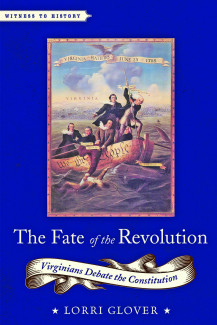
Johns Hopkins UniversityEst. 1876
America’s First Research University
Running We Know Not Whither: 1788 vs. 2016

For someone who spends much of her time in the eighteenth century, studying men like James Madison and George Washington, the specter of Donald Trump as a standard-bearer for our American Republic is astounding. Sure, the country has convulsed before. Struggles for inclusion have been met with inevitable but still shocking backlash. And there are certainly precedents, dating all the way back to the founding era, of civic-mindedness falling victim to blistering vitriol and vicious factionalism, of politics degenerating into fear-mongering, of demagogues spewing rants. Even George Washington was vexed by—and he roundly condemned—political speech “addressed to the passions of the people; and obviously calculated to rouse their fears.”
If misery loves company, on first glance, the provocative debates in Virginia in 1787-1788 over whether to adopt the Constitution might offer some relief from current distress over the future of the republic. We often forgot how controversial the Constitution was when it was first unveiled in September 1787, and how close it came to failing. The Virginia Ratification Convention, held in Richmond in June 1788, was the most important and vigorous contest between the most talented and evenly matched leaders of the entire revolutionary era. One side, led by James Madison and George Washington (who worked behind the scenes from Mount Vernon), championed the Constitution as a panacea to all the problems besetting the floundering union of states. Washington flatly insisted “that there is no Alternative between the Adoption of it and Anarchy.” On the other side stood equally certain and formidable men like George Mason, James Monroe, and Patrick Henry. Monroe, a wartime hero and future president, concluded the Constitution “is a dangerous Government, calculated to secure neither the interests, nor the rights of our countrymen.” Henry was less restrained: “I despise and abhor it.”
By the time these forces collided, the citizens of Virginia had spent nearly nine months in fierce debate about the plan, in taverns and homes, through letters and newspapers. Some took the low road. There was an activist press, distorting the truth and inflaming resentments. Partisan writers claimed that if their side lost, the United States would descend into civil war and grieving mothers would endure “the loss of their slaughtered husbands, the rapes of their daughters, and the mangled bodies of their sons.” Some voters fell prey to incendiary rhetoric and let their fears overwhelm their resolve to seek the greater good. Long-respected political leaders waffled and disappointed. When Governor Edmund Randolph, who had refused to sign the Constitution at the Philadelphia Convention, changed his mind in favor of ratification, he came in for withering criticism. George Mason took to calling him “young Arnold.” For anyone who’s followed modern American politics, parts of this story feel sadly familiar.
But a closer look reveals something very different from where we find ourselves today. The rancor and recriminations sweeping across Virginia in 1787-1788 were an outgrown of—not a substitute for—serious, informed, and deeply convicted ideas. Voters understood that it was their solemn duty to learn everything they possibly could about the Constitution, to weigh the language and ideas and implications of the design, to, as one man put it, “acquire every information which might assist my judgment in forming a decision on a question of such magnitude.” In the formal convention, the two greatest adversaries, Patrick Henry and James Madison, weren’t seeking power for power’s sake. Neither was wantonly cruel or casually deceitful. And they certainly weren’t cavalier about their responsibility. They and the great majority of Virginians who entered into debates during the ratification controversy sharply disagreed about the best way to chart a future for the United States. They arrived at contradictory conclusions after carefully scrutinizing every phrase and clause of the Constitution, after rigorous study of political theory, philosophy, economics, and world history.
After weeks of debate, Patrick Henry lost. (The margin was razor thin: 89-79. Five votes swung in the opposite direction would have turned the fate of the United States.) On the last day of the debates, as Henry counted votes and came up short, he gave a telling final address. He felt, he said, “those painful sensations, which arise from a conviction of being overpowered in a good cause. Yet I will be a peaceable citizen!” “I wish not to go to violence,” he reiterated, as he vowed to work within the bounds of the law to see the federal government “changed so as to be compatible with the safety, liberty and happiness of the people.” Henry also remained in Richmond after the vote. He worked with James Madison, George Mason, Edmund Randolph, James Monroe, and all the other leaders from both sides to craft proposed amendments to the Constitution.
These deeply-divided Virginians embraced the notion that good and honorable people could disagree, that reasoned and responsible leaders would arrive at different philosophies of government, and that vigorous contests over serious ideas enriches a representative democracy.
Had Marco Rubio or John Kasich or nearly any other leading Republican prevailed in the GOP primary, we would be entering again this now well-worn pattern of American politics: divergent philosophies of government intermittently giving way to heated partisanship and hyperbolic accusations. Mr. Trump’s candidacy of rageful name-calling and prideful disregard for political principles instead calls to mind another, eerily uncomfortable warning from the Virginia ratification debates. We are,” Patrick Henry cautioned, “wandering on the great ocean of human affairs. I see no landmark to guide us. We are running we know not whither.”
Lorri Glover is a professor in the Department of History at Saint Louis University and the author of The Fate of the Revolution: Virginians Debate the Constitution.



